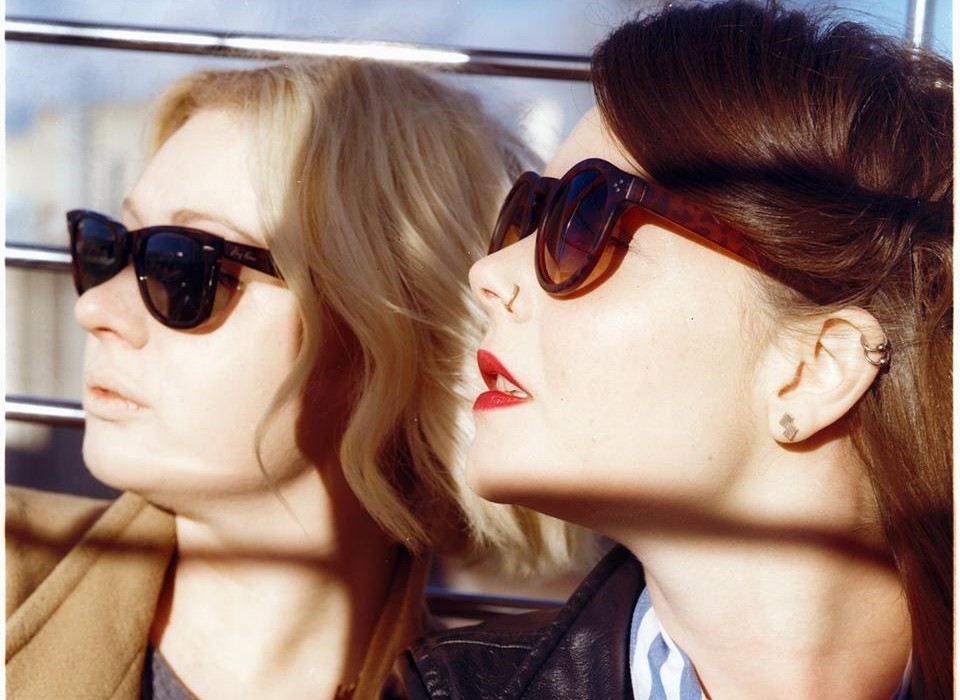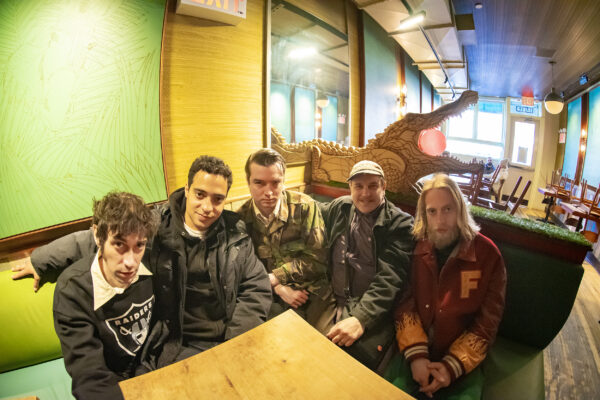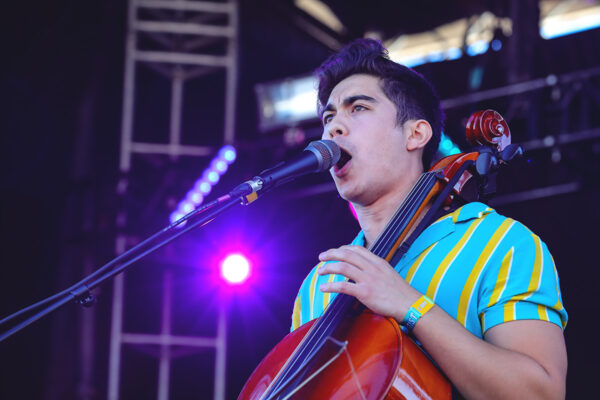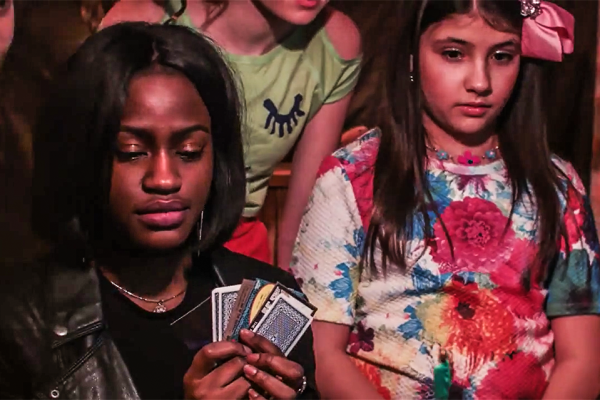In the fall of 2013, Glasgow based band Honeyblood traveled all the way to Connecticut to record what would become their debut album. Guided by the direction of producer Peter Katis, singer-guitarist Stina Tweeddale and drummer Shona McVicar spent ten days in the producer’s residential studio, intent on capturing the blistering melodies and high-energy atmosphere of their live show.
Known for his work with the National and Interpol, Katis’ production allows for a fast-paced, lively record that preserves the music’s razor-sharp attitude. And though McVicar recently left the group, the addition of drummer Cat Myers has added another layer of electricity and muscle to the band’s performances.
In mid-February, Tweeddale talked to Pancakes and Whiskey before embarking on a tour that would see the group return to the US. In addition to expressing her excitement for the upcoming concert dates, Tweeddale revealed that the group is already working on new songs, stating that, “We did a couple of tracks, so we’ve already recorded some new material.” She also discussed her earliest influences, songwriting and what it was like to record Honeyblood’s first record so far from home.
You got your first guitar at the age of twelve. Would you say your father being a musician had any impact on you picking up the instrument?
Yeah, well what actually happened was I took guitar lessons at school as a way of kind of trying to impress him. When I started school, you got a choice of instruments and initially I wanted to play the trumpet, but they give you a test to kind of blow into it and that wasn’t good for me, I couldn’t do it. So my second choice was guitar and when I took the guitar lessons I was like, “Right cool, I won’t tell my parents that I’m doing that.” And then what my goal was, was to just learn a couple of chords so then I could maybe go around the house and just pick up a guitar and just play them (laughs). And then he’d be like, “Wow, you picked that up really quickly, how do you know that?” You know? Like I could impress him.
I kept it a secret for like six months and then I must have told my mum or something because then when I eventually got around to doing this and picking up the guitar, he’s like “Oh, yeah I knew the whole time.” And I was surprised, I was totally gutted.
When you first started playing and finding your own style, were there any artists you would emulate?
When I was younger my first ever band when I was like fourteen, we did a cover of a Hole song, we did a cover of a No Doubt song, which was “Ex-Girlfriend,” and I did all the rapping parts as well. And the Lemonheads, we used to do Lemonheads songs. They’re the bands that when I was a kid I have recordings of me doing those covers, they were like the first covers I ever learned I think (laughs).
When you first started playing, did writing your own material feel very natural or was it an intimidating process?
Yeah, I’ve always written songs actually. Since I’ve been really young, like before I could play any instruments I was still singing songs, and when I started playing guitar I was like, “I only want to learn chords so that I can play my own songs.” Because when I went to lessons, they try and teach you classical.
I went to classical lessons to learn how to play certain melodies and I was like, “I don’t want to learn how to play melodies, I just want to play chords so I can sing along.” I’ve always been writing and I guess I’ve tried to get better…I tried to get better at playing guitar so then I would be able to do what I hear in my head.
You’ve said previously, that “This has ended up being the band I wished I was in when I was fourteen.” What did you mean by that, and how did you see yourself in terms of being a performer at that age?
I think because I was in bands before. When I was at University I was in a band and I just sang, I didn’t play guitar. I stopped playing guitar for like three years and I just wrote the melodies and became a front person, if that makes sense?
Yeah.
Rather than a songwriter. That was really different for me and having to kind of use other people’s influences as well, and what other people liked and what music they listened to changed what I was doing. And when it comes to Honeyblood, Honeyblood is really personal to me because it’s everything that I think is so attached to my personality and everything that I love about music, it goes into it- it’s a very connected thing. So I guess it kind of stems from that first band I was in when I was fourteen, and all the bands I listened to when I was younger.
Even though I think a lot of people who love music will go and try different things and try different genres, a lot of times when I hear people talk about their favorite bands, their favorite bands have been their favorite bands since they were teenagers and that never leaves you. And I think that’s what I mean when I say it’s the band I wanted to be in because the influences I take from, they all stem from that time period. Which is kind of funny (laughs). But I think it is the truth though.
Honeyblood is signed to Fat Cat Records, which is home to a slew of artists, among them Frightened Rabbit and Animal Collective. I would imagine that to be an artist and be signed to any label would be monumental, but what does it feel like to call that label home?
I think for us it’s definitely a home away from home, seeing as a lot of their bands are Scottish bands (laughs). So I just find it hilarious, I find it so funny. We have an in-joke that Alex Knight from Fat Cat is actually Scottish because he’s probably the most London Londoner I’ve ever met (laughs). He’s just got this crazy monopoly over Scottish bands, he’s got his total eye fixated on it. And he’s still signing Scottish acts, he just signed C Duncan who is in Glasgow, a couple of months ago, maybe? So he’s still at it, which is kind of funny (laughs).
They’re great and I couldn’t think of another label who would do so much for letting a band develop. We pretty much started talking to Fat Cat on our second show, and they were OK with us like, “Oh, you only have three, four songs? That’s fine, here’s some time, just write some more, and we’ll just do an album when you’ve got it.” And I think that nowadays is when a lot of labels are like “You need to be finished.” You need to be ready to go or they’re not going to look at you, give you a second glance.
It’s very old school to do it that way, to give the band a little bit of breathing space, a little time and a helping hand to develop. I think a lot of acts don’t really get that treatment now, and I don’t think we would be the band that we are if they hadn’t given us that push in the right direction and a little bit of help. They’re a good team to have.
You’ve also said that recording the band’s debut in America was overwhelming. I’m curious, prior to recording here, what was your view of the American music scene and was it what you had imagined?
Yeah, I think it was for me because I listened to a lot of American bands when I was growing up and that’s really influenced Honeyblood. To get the opportunity for your first album to go anywhere that’s not, you know, in your house or down the road to record is a bit overwhelmingly amazing. I don’t really know what I expected from American venues or the music scene, but we always have a really good time so that’s good (laughs). And I’m really excited to be coming back.
It’s definitely something that because of the bands I listened to when I was younger are American, it’s kind of like a pipedream to come over. And I guess it’s probably the same thing when American bands who listen to a lot of British music…it’s that kind of crossover. It’s always going to be a little bit surreal until it happens, and then it’s still a bit surreal to be honest.
How did working with Peter affect the group’s creative process?
Quite a lot, to be honest, but in a good way (laughs). Peter is a total character and he is a great producer, and I feel so honored to have worked with him. I felt, I don’t know, a bit star struck when I first met him, which made me out to be a total weirdo because I just couldn’t even speak to him the first day. I was in his house and with his family and was just “UHHHH,” and still kind of jet lagged and didn’t really know what was going on.
He’s very wise. He said to me when we were recording in the beginning, he said, “There’s always going to be a point, regardless of how much time you have or how much control you have over the process, you will have the ‘freak-out.’” And I was like, “What? What do you mean by a ‘freak-out?’” (laughs).
We had thirteen songs to record in ten days and he was like, “I don’t think that you will get it done, I’m just telling you because obviously I’m trying to give you the best help here, but I don’t think you’ll do it.” And the day before the end, I had a ‘freak-out’ because I still had four songs to complete and they were the singles.
I already recorded the ones that I didn’t know so well, the newer ones maybe, or the ones that were kind of slower, first of all to kind of get them out of the way. I think, “Choker” was one of the last ones and then, “All Dragged Up.”
He sat me down and was like, “OK, I just don’t think that we’re going to get all the songs done, so you have to make a choice of which ones you don’t want to do.” And I was like, “Oh no, well I can’t do that because I need to have these ones on the album, that’s why I left them til last!” So we just had to do them.
At the end of the ten days at eight o’clock at night, we ended up having done them all, and we really don’t know how that happened (laughs). Like, still to this day, I have no idea but it did happen.
He’s totally realistic in what his expectations are, but he’s so encouraging and it was just great to have someone who made me feel at ease. Because it’s a nerve-wracking process to record your first ever album, like I’d never done anything like that before and I think sometimes it can be a bit scary. And he’s like, “It’s cool, it’s fine, this happens to everyone, this is what we need to do,” and that was really good. And also, he’s just really good at his job, too. He was a really good fit for us.
Honeyblood is known for having a really raw, energized sound, and the full length really captures what can be very difficult to capture. Did you ever worry that being in a recording studio would dull that energy?
Yeah, that was the main thing that was on my mind. I think for a debut album and especially for a band that continuously plays live, it’s so important. I wouldn’t say we are a studio band, you know? Like a band that does their albums and then takes the songs and plays it live. We play the songs live first and then go and record them. We had that in our heads and what we actually did, Peter was like, “Let’s not record to a click track…you guys are solo, you don’t need a click track. The songs rise and fall where they do and they speed up and slow down and that’s the way they’re supposed to be.”
So half the album is not recorded to a click track and I think that in itself, although it’s such a small thing, it makes the album sound like the live set. It’s not controlled as much, you know? It’s not supposed to be perfect, it’s supposed to be the way that the songs are. So for us, when I listen to it, once we recorded everything, we put the vocals on and kind of added whatever else we had, it sounded natural. More natural than if we did record to a click track. And the guitars and the drums were actually recorded at the same time, as well.
Do you have a favorite song on the record?
It changes, still (laughs). I would say that “Braid Burn Valley,” is probably my favorite one. It was one that we hadn’t ever played live to an audience, we played it live together. We never played it live until we recorded the album because it is a bit of kind of a slower epic one. And you know, we were supporting on tours, there wasn’t really a place for that song. But I think that one is the most personal to me on the album and I’m really happy the way it turned out. I think it was the first vocal take…everything about it just kind of fit into place, so it’s still my favorite one.
Shona left the group this past fall for the second time. Do you foresee a time when she could return?
I don’t know, I think it’s pretty final now. Yeah, a lot of people don’t know this; she left the first time as well. She’s gone off to become a dentist… Well she was a dentist and yeah, she’s gone to pursue that career. Now we have Cat, so Cat’s a full-time member and she’s a professional drummer- that’s her job, so I don’t see her leaving anytime soon. You never know, maybe we’ll have two drummers in the future! (laughs).
Yeah! (laughs). Well I know you’ve said in the past that the goal was never to stay a two-piece, even though it ended up gelling and it ended up working. So yeah, I guess I didn’t know if she’d come back and you’d be a three-piece (laughs).
Yeah, the thought is always out there for that. One day it will, I’m pretty sure one day we’ll expand. But it becomes difficult when you’re touring as well and getting to the stage that we are at, to find a person that you would want to join in, if you know what I mean, like musically. And everyone that I would like possibly, is in a band that’s better than Honeyblood anyway, so they wouldn’t want to leave their great band to join my band, I don’t think. Because I always meet people who I totally admire so much and I’m like, “Oh, if only they could come play with me!” But so far, it’s not happened. Maybe one day…definitely one day, I just have to find the person.
And since Cat has joined the group, would you say the dynamic of Honeyblood has changed? What’s it been like to play these older songs with Cat?
It’s been really fun, actually because she’s so energetic. She’s nuts! And the shows have changed. Before we never had anybody crowd surfing at shows, I think maybe one show. Now it’s like a regular event and at a couple of shows we had circle-pits. That’s pretty epic for Honeyblood, that never really happened before (laughs). Just because the energy’s there and it kind of has, I would say, stepped up a notch, the live show.
I mean, it’s always going to be different because people play differently and they have their own spin on things. But yeah, it’s been really fun so far. The shows have been like proper wild, which maybe before they were a little bit more subdued. It’s only been good that we’ve heard so far, from people who are coming to shows, which I was really happy about; that everyone’s so supportive of Cat. And she’s having a great time as well, she’s really excited to come over to the States, too.
Don’t miss Honeyblood when they perform at Rough Trade in Brooklyn on 2/27
Article by: Caitlin Phillips




